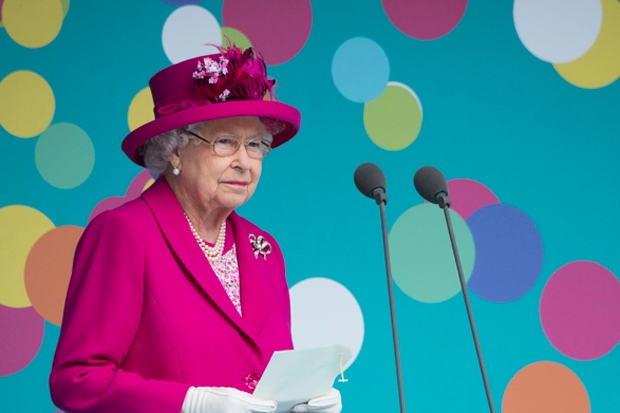The Remain campaign takes as its model the ‘No’ one in the 2014 Scottish referendum. First and last — hence the Osborne/Darling fantasy horror Budget on Wednesday — inspire fear. Second, late in the day, leave it all to Labour and get Gordon Brown to make a passionate speech (Mr Brown took this too literally and made almost exactly the same passionate speech). Finally, shortly before polling, get leaders of all stripes to make a solemn ‘vow’ to win over the doubters. I am trying to work out what that vow could be. All 27 other member states promising some guarantee of Britain’s independence within the EU? This device has already been tried — David Cameron called it his ‘deal’ for a ‘Britain in a reformed Europe’ — and no one was impressed. There isn’t really any leading Remain supporter left standing whose vow could be believed. So unless Mr Cameron can force the Queen to make a Diana’s-funeral-style broadcast ‘as your Queen and as a grandmother’ in favour of Remain, it is hard to imagine what shots are left in his locker.
I keep telling myself that the polls showing Leave ahead are too good to be true. But then I see Remain’s latest efforts and feel reassured. One of its earliest campaigners was the self-important businessman Sir Mike Rake who, I wrote at the time, is pure gold for Leave. This week he pops up again, ordering his Rolls-Royce workers to vote to preserve his seat at the top table. Keep talking, Sir Mike: until 23 June, we need to see much more of these hard-faced men who have done well out of Brussels.
The real crisis, though, is not for capitalism, or even for the Conservative party, which seems, perversely, to be doing quite well by leading the debate on both sides. It is for the left. In order to modernise themselves 30 years ago, Labour decided to accept everything European. The breakthrough was Jacques Delors’ famous speech to the TUC in 1988, for which he was hymned as ‘Frère Jacques’ and the best opponent of Margaret Thatcher. ‘Europe’ now seemed to mean trade union and welfare rights. Labour embraced it. In doing so, however, it abandoned the classic left-wing vigilance against the ‘bankers’ ramp’, the device which allows nations, workers and democracies to be overpowered by banks, central banks and their lackeys to run an economy in their own interests. The euro is just such a ramp. It was imposed without democratic endorsement and cannot be unstitched by democratic rejection. It is intended as the forerunner of political union, so the structure of that union is planned by the banking interest. Hence perma-slump in large parts of the zone, 50 per cent youth unemployment in the worst bits, and German domination of the whole. Never, since the age of the dictators, have the workers been further from control over the means of production, distribution and exchange than they are in the EU today. Jeremy Corbyn half-realises this, but is too weak to say it, and so campaigns for Remain with his fingers crossed behind his back.
I recommend a new essay, ‘The Left Case for Brexit’, in Dissent magazine, by Richard Tuck, professor of government at Harvard. He argues that the power of the House of Commons, pre-EEC entry, was much better suited to bringing about left-wing reform than the more restrictive constitutional arrangements which prevail on the Continent. In Britain, the word ‘Labour’ in politics meant chiefly the representation of the interest of labour in Parliament. When this was decisively achieved, in 1945, it gave unique scope for radical reform. Such popular politics, Tuck argues, ‘is precisely what the EU was designed to obstruct’, in order to establish a technocracy. ‘Technocracy is not … a neutral or rational system of government. Instead, it confers immense power on culturally select bodies whose prejudices will be those of the class their members are drawn from.’ So, by supporting the EU, the left has fatally endorsed what it can never control.
It follows — this is now me talking, not Professor Tuck — that Labour’s traditional supporters are right to feel betrayed by their party over Europe, and to focus their anger on immigration (and therefore, among others, on Gordon Brown). Workers dislike economic vicissitudes, but at least they know that what goes down will probably go up again. With mass immigration, they see permanent, irreversible change which they have not asked for. Their jobs, public services and culture pay a high price and the people who impose the change upon them pay no price at all (indeed, they benefit through cheaper domestic staff etc). To feel the rage of Labour’s ruling class when their supporters get uppity, read Polly Toynbee’s latest Guardian column. Polly is a vivid journalist, because she cannot conceal her passions under the usual veneer of sophistication. She has spent a bit of time ringing up Labour voters on behalf of Remain and is shocked. She cannot believe that such people are ‘impervious to love letters from Der Spiegel’. She is disgusted when they say, ‘We’re full up. Sorry, there’s no room for more.’ What fascinates me is not her disagreement with such views, but her Marie-Antoinette-like incomprehension when confronted by poor people who feel that the bread of democracy has been taken from them.
After the Islamist atrocity at the Pulse Club in Orlando, it is argued that 1.4 million people have been killed by guns in the history of the United States, and therefore strict gun control must be introduced. No doubt some measures might help. But is this as much of an answer as it sounds? In the much shorter period in which Aids has existed, roughly 650,000 people in America have died of it. Anyone who argued that, to stop Aids, ‘MSM’ (men who have sex with men) should be banned from doing so, would rightly be condemned, first because it would interfere with human freedom and second because it wouldn’t work. To a surprising extent, the same problems apply to gun possession.
 Will Britain vote to leave the EU? Can the Tories survive the aftermath? Join James Forsyth, Isabel Hardman and Fraser Nelson to discuss at a subscriber-only event at the Royal Institution, Mayfair, on Monday 20 June. Tickets are on sale now. Not a subscriber? Click here to join us, from just £1 a week.
Will Britain vote to leave the EU? Can the Tories survive the aftermath? Join James Forsyth, Isabel Hardman and Fraser Nelson to discuss at a subscriber-only event at the Royal Institution, Mayfair, on Monday 20 June. Tickets are on sale now. Not a subscriber? Click here to join us, from just £1 a week.







Comments